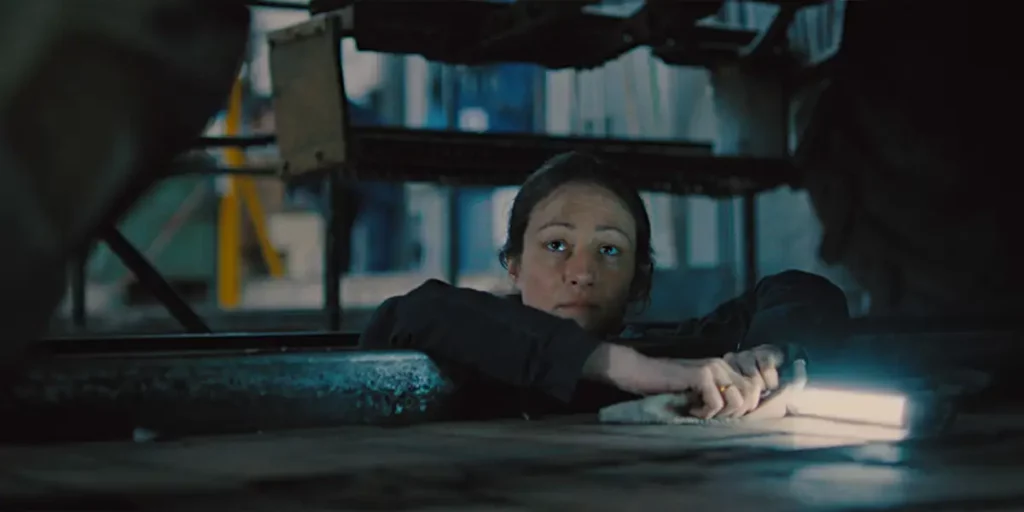Every You Every Me finds an interesting way to show us someone who’s falling out of love with their partner, though the film doesn’t always know which story it’s telling.
Every You Every Me (Alle Die Du Bist) begins with a woman entering a building in a hurry and knocking on a glass. Someone shows up and asks, “Are you Mr. Lichter’s wife?.” Having learned that she is, the man gives her instructions on where to find him. “He locked himself in the storeroom downstairs,” another woman tells her, as our protagonist rushes down the corridor to reach him. Soon, we learn that he was in the middle of a job interview, but he “ran away after two minutes” and is refusing to leave the room in which he’s confined himself. When she finally reaches the locked door, she climbs it, knowing that her husband won’t come out of his own accord. Finally, she reaches him and hugs him, but… Let’s just say that Herr Lichter doesn’t exactly look like what we’d expect him to.
Writer-director Michael Fetter Nathansky (You Tell Me) finds a creative way to introduce us to Every You Every Me‘s protagonists – the disillusioned Nadine (Aenne Schwarz) and her husband Paul – and that’s the most distinctive feature of the film. When we first meet Paul, he’s shown to us in the shape of a cow, whom Nadine caresses to try to soothe him. For a moment, she walks away from him. She comes back, and Paul is a little child (Sammy Schrein), who’s calmed down from his panic attack but who still acts purely on instinct, which means that Nadine still needs to contain his outbursts of emotion.
When they leave the building, he looks like a young man (Youness Aabbaz) – presumably the man she fell in love with – and though he’s a little clingy, he seems to be a lot more balanced. “I’ll take over so you can rest,” he tells her in the car, taking the driver’s seat, and he suddenly looks like an old lady (Jule Nebel-Linnenbaum), who embodies his most maternal side. Finally, they reach the house and reunite with their kids, Mica (Naila Schuberth) and Eleni, and, from a photo on the table, we find out what Paul (Carlo Ljubek) actually looks like.
Halfway through the film, Nadine confides in her co-worker Ajda (Sara Fazilat). “Do you know the feeling when you look at a stranger and find it odd, how he talks and what he says, and after a while you realize that it’s your husband?,” she asks. Having seen her interact with actual physical representations of the many sides of her husband’s personality, we know exactly what she’s talking about: it’s perfectly clear that Nadine and Paul’s relationship has reached that point where looking past each other’s flaws and finding the love beneath it has become a challenge.

Nathansky uses various actors (and an animal!) to portray Paul, and this approach is extremely interesting on a visual level, as we immediately understand the way Nadine sees him when they share the same room. And what makes it work, at least initially, is that many of us experienced that situation: the moment you start being annoyed at everything your better half does, and you realize that it’s not them, it’s you. You’re falling out of love with them, and yet, at the same time, you don’t want to let go completely, searching your feelings and hoping there’s still a chance the spark will come back. And so, you don’t say anything, but silence only makes the doubt feel louder, and you can’t help but analyze every aspect of your relationship over and over again, until you’re ready to find – or face – the truth.
The first half of the film successfully conveys this feeling by showing us snapshots of Nadine and Paul’s everyday moments, juxtaposed to flashbacks of their first meeting and exchanges, as co-workers in a factory. The real Paul shows up various times throughout the movie, and there are parts where he looks like himself for quite a long time. But it’s hard to understand what he’s like as a person, even if we combine the various versions of him throughout the film, as we mainly see him as someone that Nadine reacts to – often in a negative way.
The paradox is that, at the same time, it’s hard to see Every You Every Me as the story of a woman. Yes, the story is told from her point of view from the very first shots, and the different versions of Paul we meet throughout the movie depend on Nadine’s role in the relationship – mainly, that of the carer and problem solver, that she assumes when he’s having a panic attack or they’re dealing with issues at work. But instead of being shown “the painful process of falling out of love and the initial magic of falling in love,” like the Berlinale‘s synopsis reads, what we get feels more like the story of a man whose woman seems to be annoyed by everything he does. It’s a subtle difference, but it matters because it’s what determines whether we, as an audience, look at her with compassion or blame her for her feelings – or lack thereof.
To me, it was neither, and I feel that it wasn’t the story the director meant to tell. It’s hard to pinpoint what exactly didn’t work for me in the film. I was extremely interested in this tale at the start, and there are some fantastic dialogues throughout. There’s a scene where Janine and Paul are in bed and she tells him he stinks, but he can only “smell it too” when he looks at himself in the mirror, which makes us realize that Janine isn’t the only one who doesn’t like him anymore – or, perhaps, it’s Janine’s lack of love that affects his self-esteem too.
But these scenes are scarce in a movie that keeps showing us the same dynamics in a very detached way, and that can’t quite make up its mind on which story, and whose story, it wants to tell. It also doesn’t help that a number of subplots are thrown into the mix, from layoffs at their workplace to Nadine’s potential post-natal depression and Paul’s mental health issues – neither of which are never really fully explored.
By the end of Every You Every Me, I despised Paul, I was disappointed in Janine for the choices she didn’t make, and I was puzzled as to what drew these two people to one another in the first place. It’s a shame, because the film had so much potential, and its incredibly fascinating visual approach could have really helped explore its protagonists’ psyche in depth. Perhaps the movie would have worked better as a short film, which would have enabled Nathansky to use Paul’s many personas to explore the main theme of the film in more depth before they outstayed their welcome.
Every You Every Me premiered at the 2024 Berlin Film Festival. Read our interview with director Michael Fetter Nathansky.

